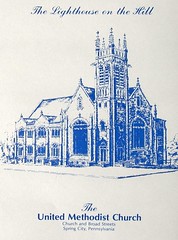Cry Out to God
September 23, 2007
from Psalm 97
My sermon outline:
• Not your typical sermon fodder, Psalm 79. We tend to be more comfortable with the rose-colored glasses. I was tempted to skip this Psalm (lectionary) and I’da been in good company: John Wesley deleted Psalm 79 and 49 others from the daily devotional readings because he deemed them “highly improper for the mouths of a Christian congregation.”
However a UM worship preparation resource website suggested “Don’t skip this psalm. Lead your congregation in prayer with it.” Cuz whether or not you think Christians should feel the things this Psalmist feels, they do feel them.
• Psalm facts. 150 psalms, many types. both God’s words to humankind and humankind’s words to God. Lament (communal, individual), thanksgiving, praise, song, royal, wisdom… 79 is a psalm of communal lament. Laments make up the largest chunk of the psalms – somewhere around one-third of the psalms are psalms of lament.
Characteristic elements of lament psalms include a cry out to God, a description of trouble, a plea or petition for God’s help, a profession of faith or trust in God, and a promise of praise.
At times the laments may seem pessimistic, at times harshly judgmental, and at times they’re just what the doctor ordered, they’re statements of faith even in tones of despair. They can be cathartic, healing, as if uttering them somehow releases pressure or poison, somehow strengthens resolve. You may never think of bad news as good news but there’s times. (Tricia’s diagnosis was good news cuz it meant we knew something).
• Psalms are poetry, and while you can learn something by dissecting, there is much power in its imagery and in what it evokes within you. Without that evocative power something vital would be lost. Big difference between saying “God takes care of me” and “The Lord is my Shepherd.”
• So my re-imagining of this psalm:
World forces have conspired against you, God;
they have severely beaten your earthly body.
They’ve shamed and humiliated
your servants who love you.
How long will you let this happen, Lord?
Turn your righteous anger on those
who mock you and shame your people, Lord.
Turn your anger away from your servants and their children,
for we have been brought low.
For the sake of your good name,
deliver us, restore us, forgive us.
Don’t let the enemy laugh at you because of us – show them who you are!
We praise you, Lord;
we remember your steadfast love forever.
• As Augustine invites, so I invite thee to WRITE.
If the Psalm prays, you pray;
if it laments, you lament;
if it rejoices, rejoice with it;
if it hopes, express your hope too;
if it fears, you also fear;
for all things written herein
serve to mirror ourselves.
• How have you / your family / your community been brought down, shamed, ruined? How have you been mocked? What causes your soul to grieve? Write it down. Pray it.
• Verse 5: we often say “God is in control”. Ask God why things are the way they are. Cry out to God for help, for salvation, for deliverance. What would you ask of God? What would you ask God to do? Why should God listen to you?
• What do you have to offer to God? Not in terms of trading or bartering, but what will you give God regardless of circumstances?
• On a recent hospital visit notes of encouragement and praise for coworkers. What notes would you give to God? What praises do you have right now?
• Hymn 430: O Master, Let Me Walk With Thee
- Pastor Kerry
This Sunday: 66 in worship. Lovely weather.


0 Comments:
Post a Comment
<< Home